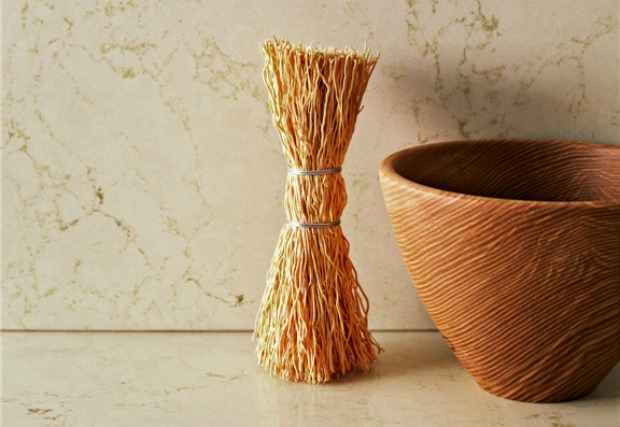When Israel’s Caesarstone unveiled its latest product, even the most trained eye could hardly tell that the soft kitchen countertop replete with gray veins was not made of marble. Thanks to cutting-edge Israeli technology, the stone material looks and feels like marble but doesn’t stain, chip or scratch.
That’s because the new marble-like designs are made from quartz.
Caesarstone Sdot-Yam was the first company in the world to use quartz to create a brand-new surfacing product. Today, its products are used as kitchen countertops, vanity tops, floor tiles and sinks.
“Quartz is one of the strongest minerals on earth after diamonds, topaz and sapphires. In the combination that it appears in Caesarstone products – at least 90 percent quartz and some 10% binder products – the result is highly scratch-resistant, doesn’t crack and doesn’t stain,” Caesarstone CEO Yos Shiran tells ISRAEL21c.
The quartz used in Caesarstone is mined in Brazil, India or Turkey and then shipped to Israel for production. There are two plants and four production lines in Israel, with a fifth line now being established.
Shiran says the secret to creating such a beautiful look lies in the Israeli-innovated process of combining the hard mineral with high-quality polymer resins and pigments and then compacting it under intense vibration, vacuum and pressure into dense nonporous slabs.
“In terms of the process, the quartz is mined and crushed into different-size fractions (grains) at the source and then shipped to Israel,” says Shiran. “All production is done in Israel. We take the crushed quartz, mix it with binders, press it at high pressures, send to a curing process and then to polishing.”
From Israel, the finished slabs are shipped to customers in 45 countries across the globe.
Eat off the countertop
Caesarstone revolutionized the industry 25 years ago, though the product did not enjoy widespread popularity until more recently.
In the mid-1980s, Kibbutz Sdot-Yam sent the CEO of its faltering terrazzo tile factory to find the next big thing in flooring material. He found an Italian company that produced stone surfaces using polyester to bind ground bits of stone. After production, the stone became dense and impermeable.
Upon his return to the kibbutz, he shared his ideas and experience with residents of the then fishing and farming community, and conceived the idea of using crushed quartz combined with polymer resins and pigments for a surfacing product.
“It really was a startup at the time. The idea to take quartz and work with it in this method was revolutionary,” says Shiran.
From the beginning, the kibbutz origin of the product assured it remained sustainable.
“The environment is very important to Caesarstone,” says Shiran, adding that ecological responsibility is a significant factor in providing a quality product.
Caesarstone Sdot-Yam is the first quartz manufacturing company to have received the ISO 14001 certification recognizing competence in environmental management and performance.
Moreover, he says, the products meet the American Greenguard exacting standards, and the company has been credited by the National Sanitation Foundation for having surfaces safe enough for use in laboratories, healthcare facilities and food-preparation environments.
You could eat straight off the countertop and not worry about lead poisoning or other radioactive contaminants, says Shiran.
He notes that the company recycles 97% of the water used in manufacturing, collects dust from shipping, handling, production and processing, and tries to save as much energy as possible. “Overall, it’s very important to us to preserve all aspects of the environment,” says Shiran.
Low maintenance, high longevity
The Caesarstone factory started operations in 1987, but the first few years were rough and the operation nearly went bankrupt. In 2006, TENE Investment Funds injected $25 million into Caesarstone in exchange for a 21.7% stake in the company. That propelled it to the leading position it now holds in the market today.
“The success of the company started with the people from the kibbutz and brought it to where it is,” says Shiran. “The private equity in 2006 contributed a lot in all business aspects.”
Though Caesarstone was the world’s first engineered quartz, Sdot-Yam members never patented the product, and today competitors abound.
“Competitors came into the game, but it’s like any other retail company — Nike, Lexus — everybody makes what they do. The original brand is important and it’s about innovation and the actual product and not just copying the process. We also have the best service in the market. Service is part of the DNA of the company,” Shiran says.
Caesarstone employs 500 people in Israel – including about 75 kibbutz members – and some 400 others around the world.
The future, says Shiran, includes evolving the company’s products and educating new markets about the “characteristics of quartz – low maintenance, low total cost of ownership, high longevity.”
Shiran says quartz is the fastest-growing countertop material in North America.
“Quartz penetration in Israel is 80%. In Spain, there’s 72% penetration and in Australia, there’s 32% penetration,” says Shiran. “In the US, there’s only around seven percent penetration and in Canada 10%. If the entire world would be like Israel in terms of using engineered quartz, there’s a lot of room for growth.”















